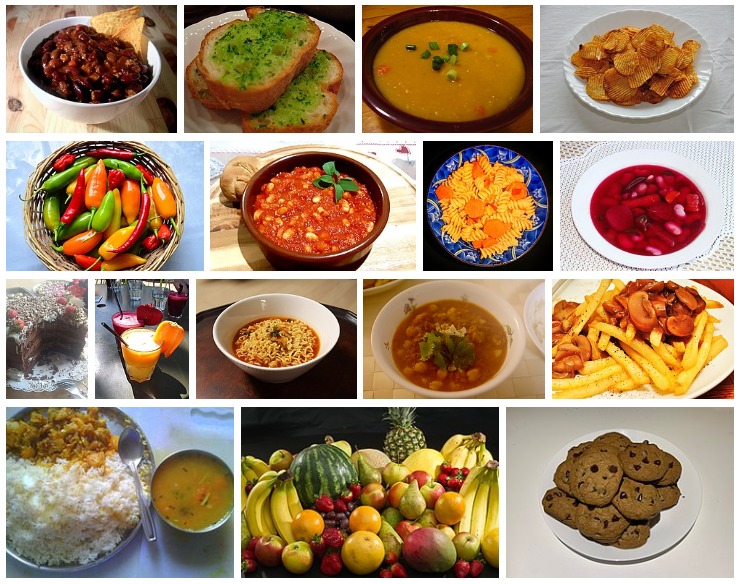Plant-based food
This page is about plant-based food.
How
- The cheap way, with low-cost ingredients and a multivitamin.
- The expensive way, for those who insist on doing everything without supplements.
Both options can give you all the nutrients you need without meat, dairy, eggs, fish or any other animal products.
Why
- For the animals - because most farm animals are treated badly in factory farms (and unfortunately, the less-cruel kinds of animal farming are less scalable).
- For humanity and the planet - because if we want to end hunger and feed the world without deforestation, then people need to eat more plant-based (and/or stop food waste).
Pictures
Just a few examples...
FAQ
"But I thought that plant-based diets lack nutrients?"
They don't have to.
"But aren't plant proteins less digestible?"
Not if they're cooked properly and you have healthy gut flora.
"But aren't plant-based burgers really processed?"
- Some are, some aren't. Same is true for meat burgers.
- Plant-based diets don't have to involve imitation meats.
- Actual peas have more nutrients than refined pea protein.
"But I heard that grass-fed cows can be raised sustainably?"
- Maybe yes if the cows are a part of rewilding grasslands as a form of nature conservation. Most beef & dairy does not come from this sort of farming. And even if every suitable land on Earth had this type of cattle farming, it still would not even come close to producing enough protein for 8 billion people. The world needs crops, and it would be far more efficient to turn the crops into food directly instead of feeding the crops to animals. If we want to phase out crop-fed beef, we're going to have to eat less beef overall.
"But don't cows eat the parts of crops that are too fibrous for humans to eat?"
Cows are ruminants, so yes, they can convert fiber into protein. But mushrooms can do that more efficiently.
P.S. Chickens & pigs are not ruminants. They eat the same grains that could have been milled into flour and used in food for people.
"But aren't chickens useful on farms to control pests by eating the bugs that infest crops?"
Sometimes yes. However, this alone wouldn't even come close to producing as much chicken as people eat. The arguments for eating less meat still hold true.
"What about fertilizer? Don't we need animals to fertilize the soil by pooping?"
Animals don't add minerals to the overall system. They can only poop out whatever minerals were already there in the plants they eat (which came from the existing soil). Also, mass production of meat/dairy/eggs requires more crops, which just increases the need for fertilizer even more.
"If everyone goes vegan, what would happen to the animals? What should farmers do with the animals?"
- Option 1: Keep them until they die of old age.
(...)( Not very profitable, of course, but the right laws/incentives could overcome this. ) - Option 2: Keep slaughtering them at the same rate they currently are.
- In either case, the farmers would stop breeding more animals.
- In either case, people would still eat meat for another year or so, after pledging to go vegan.
- Maybe the "pledge" part sounds weird & hypothetical, but so is the idea of everyone going vegan tomorrow.
- If everyone gradually went vegan
(...)( as in, people slowly phase out meat in their diets - or people go "cold turkey" vegan but each starting from a different day - or anything in between: there wouldn't need to be a whole lot of coordination between people necessarily; just a general trend of being more plant-based ) , there'd be no "shock in demand" (...)( as economists would say ) , and thus no "what do we do with the animals". Farmers already control how many animals are bred. They would just breed fewer of them.
- If everyone gradually went vegan
- Maybe the "pledge" part sounds weird & hypothetical, but so is the idea of everyone going vegan tomorrow.
- Even after everyone is fully vegan, domesticated chickens/pigs/cows would still exist - maybe ~0.1% of today's farm animal population - kept deliberately to preserve the species. They wouldn't be used for food. Petting zoos might be a good place for them
(...)( could be privately or publicly owned, depending on the market ) . In any case, they would have to be given a decent standard of living.
This FAQ section will probably get longer over time. At the end of the day, people can survive and thrive without animal products, and it can be done cheaply or expensively or anything in between.
